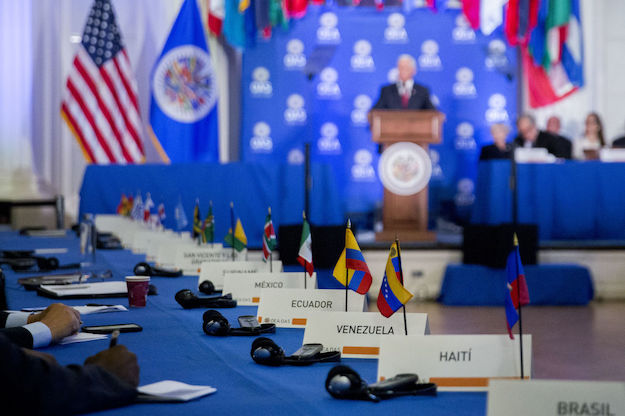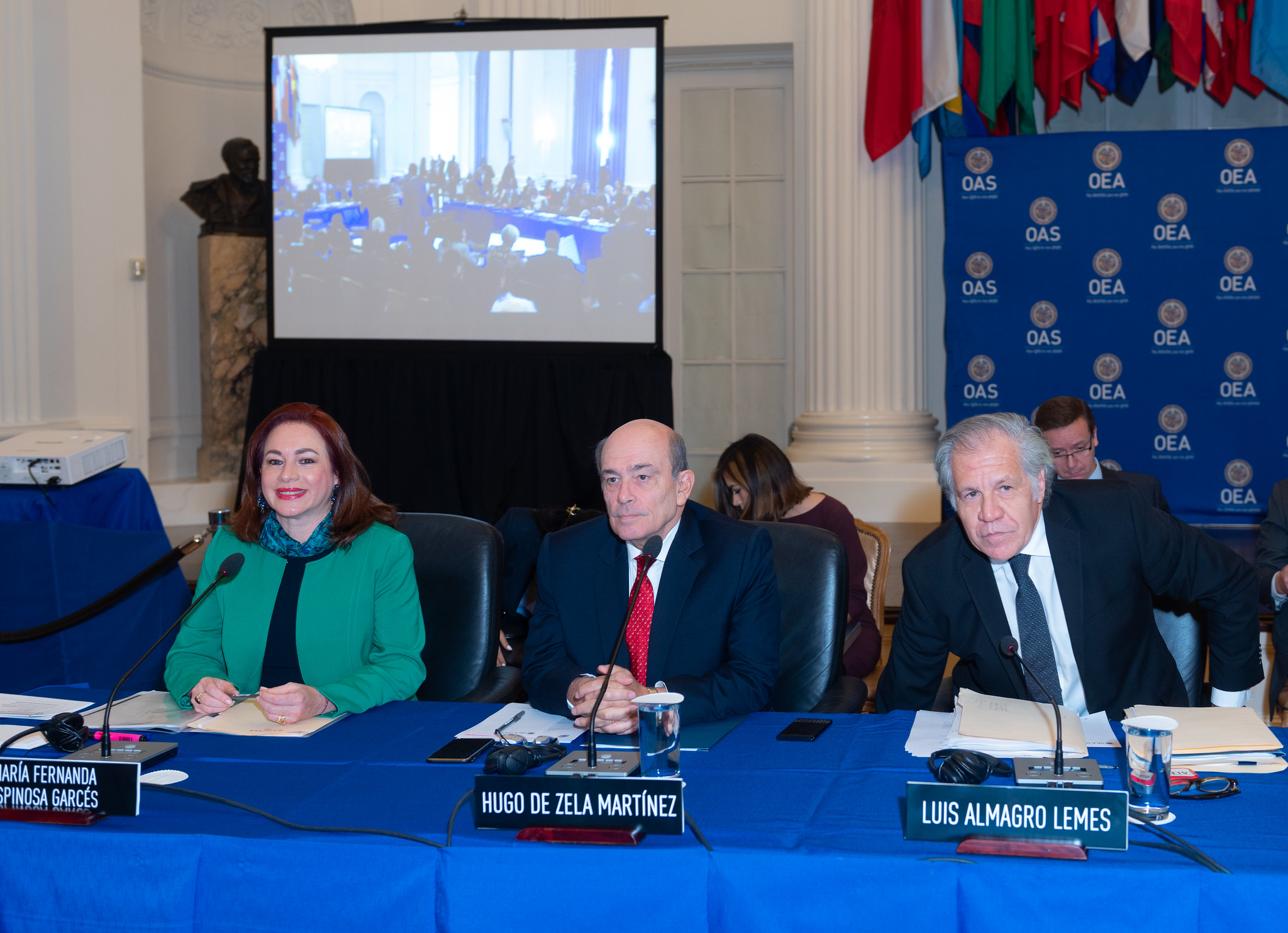The U.S. and its Latin American allies last month invoked the Rio Treaty, a region-wide defense pact, to open the door to a new round of sanctions on Nicolás Maduro’s government in Venezuela. But the move may have unwanted consequences.
Signed in 1947, the treaty is seen by many as a Cold War remnant tied to the U.S.’ legacy of intervention in the region – rather than put pressure on the regime, it may end up as fodder for Maduro’s “anti-imperialist” message.
That’s a shame, because the 16 countries that voted to invoke the treaty had a better alternative at their disposal – another historical artifact whose approach to international support for democracy could offer a way forward in the Venezuelan crisis.
In 1945, as the agenda for the upcoming Rio conference was under debate, then-Uruguayan Foreign Minister Eduardo Rodríguez Larreta proposed a framework to collectively protect and defend democracy in the Americas.
That proposal, dubbed the “Larreta Doctrine,” offered a series of commitments to democracy and mutual support, as well as pre-conditions to intervention and assistance in the region. In contrast, the Rio Treaty mostly imagined common responses to external threats.
In qualifying the circumstances under which member states would act collectively to address threats to democracy in the hemisphere, the Uruguayan tried to bridge the tension between the defense of national sovereignty and the defense of human rights.
Rodríguez Larreta’s proposal didn’t make the cut – the doctrine was left off the agenda at the conference and the Rio Treaty ultimately gave democracy only a rhetorical nod, foregrounding security instead. But the doctrine still offers relevant ideas and principles for rethinking how the Western Hemisphere approaches sovereignty, non-intervention and the protection of rights and democracy.
The doctrine included three essential elements: First, an acknowledgement that democratic governance and the protection of human rights were inseparable. Second, a call for states to agree in advance that, should egregious violations of democratic rule or human rights threaten popular sovereignty in a member state, a two-thirds vote by the remaining states would make collective action permissible. Finally, the proposal called for a pre-commitment by the only great power in the Americas, the United States, to work through the regional system instead of unilaterally.
Under Rodríguez Larreta’s view, popularly elected governments should make pre-commitments of their own, including permitting in advance the regional support of democracy should it be under threat. Outside powers helping to restore a legitimate government or counter anti-democratic forces would not pose a threat to national sovereignty because sovereignty should be based on the popular will. Anti-democratic forces could not claim true, popular sovereignty. But by the same token, action by the international community would only be legitimate if it followed clear, collectively agreed procedures. They could not be the sole initiative of a great power, dressed in humanitarian garb.
In that light, the Larreta Doctrine offers intriguing ideas for a proactive, positive approach to squaring the region’s long (and understandable) emphasis on non-intervention with a parallel tradition of republicanism, rights and democratic practice.
As Maduro’s behavior and the halting regional response have shown, a rethinking of inter-American commitments to human rights and democracy is long overdue. Venezuela is only the most blatant case of deteriorating democracy in the region. Presidents in Bolivia, Honduras, Guatemala, and Nicaragua have concentrated executive power at the expense of checks and balances. Despite their divergent ideologies, the presidents of Brazil and Mexico have evinced disregard for institutions of governance.
There are of course hurdles in trying to promote the ideas of the doctrine in Latin America today. In 1945, the debate around the proposal – like current ones on Venezuela – made it clear that military intervention would destroy the regional consensus needed for effective action. The doctrine’s critics saw it as a backdoor for U.S. imperialism, deriding it as “neo-intervention.”
While seen by some critics as interventionist, the Larreta Doctrine would also have been a disappointment to hawks. Rodríguez Larreta insisted that military intervention was not his goal. Instead, the doctrine sought to motivate early, collective action to prevent a crisis – what scholar Luke Glanville has called the “responsibility to perfect.”
In that sense, the doctrine addresses failings of the regional response to the Venezuelan crisis: that it has been too late in coalescing, and that the U.S. has failed to assuage fears of a selective, ideologically driven return to interventionism.
Many regional actors turned a blind eye to a long trend toward concentration of power in Venezuela, as long as ideology and oil revenues made the country an attractive partner. Meanwhile, the United States’ divisive approach and its inconsistency on democracy elsewhere – especially in Honduras – undermined its ability to lead when Venezuela became a priority. Opportunities to act collectively through less coercive means were lost.
Here, the doctrine points to a missing element in today’s debates about democracy promotion, the responsibility to protect, and – concretely – the response to Venezuela’s crisis. To be perceived as acceptable and legitimate, pre-commitments must bind both weaker states that are candidates for the future collapse of democratic and human rights conditions, and strong states that are potential interveners.
The doctrine further offers a solution to the sovereignty dilemma by allowing representatives of a sovereign people to work out guarantees and permissions before they lose their voice to dictatorship. It could also help protect against violations of sovereignty in the form of, say, unilateral U.S. interventions or extended military occupations, common in the first third of the 20th century.
Unfortunately, U.S. policy today has created an impediment to a Larreta-like solution, which requires a baseline of trust between Latin American states and the United States. In 1945, that had been partially achieved by Franklin Roosevelt’s good neighbor policy, the New Deal and wartime cooperation. That trust is currently lacking.
The Trump administration’s embrace of democracy has been inconsistent in Latin America and globally. Donald Trump’s affinity for strongman rulers has been widely noted. In the region, the administration has supported the Honduran president despite democratic decline and let popular internationally supported anti-corruption measures wither there and in Guatemala.
It will take time, and concrete action, for a new U.S. administration to begin rebuilding its relationship with the region. Perhaps, if the Trump presidency starts to look like an aberration and an atmosphere of trust is restored, ideas for a pre-commitment scheme to preserve democracy and human rights can be put back on the inter-American agenda. Until then, Latin American democrats need not wait for Washington, but can turn to their own history for ideas for protecting their common values.
—
Long is Associate Professor of Politics & International Studies at the University of Warwick. Friedman is Professor of History and International Relations at American University. Their article in Perspectives on Politics, “The Promise of Precommitment in Democracy and Human Rights: The Hopeful, Forgotten Failure of the Larreta Doctrine,” can be found here.








